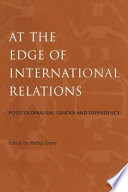
At the Edge of International Relations
By - Darby, Phillip [Other]
Floor
-
Floor 1
Published
-
Continuum, London, 2000, ©1997
ISBN 10 - 0826447198
ISBN 13 - 9780826447197
Book Status
-
3 Qnty Available with us.
Subject
-
World politics
Shelf No
-
15
Call Number
-
327.0972 EDG
Physical Description
-
[vii], 247 pages ; 24 cm.
Notes
-
Includes index
In today's growing literature on globalization, the Third World is often conspicuously absent. This book examines the reasons for and meanings of this absence and the Third World's position on the edge of the global economy, drawing on an array of sources from literary narrative and nineteenth-century medical discourse to postmodernist geography and postcolonial theory. By illustrating the extent of globalization and its relationship to gender, race, and sexuality, the contributors to this timely collection fill a critical gap in the field of international relations.